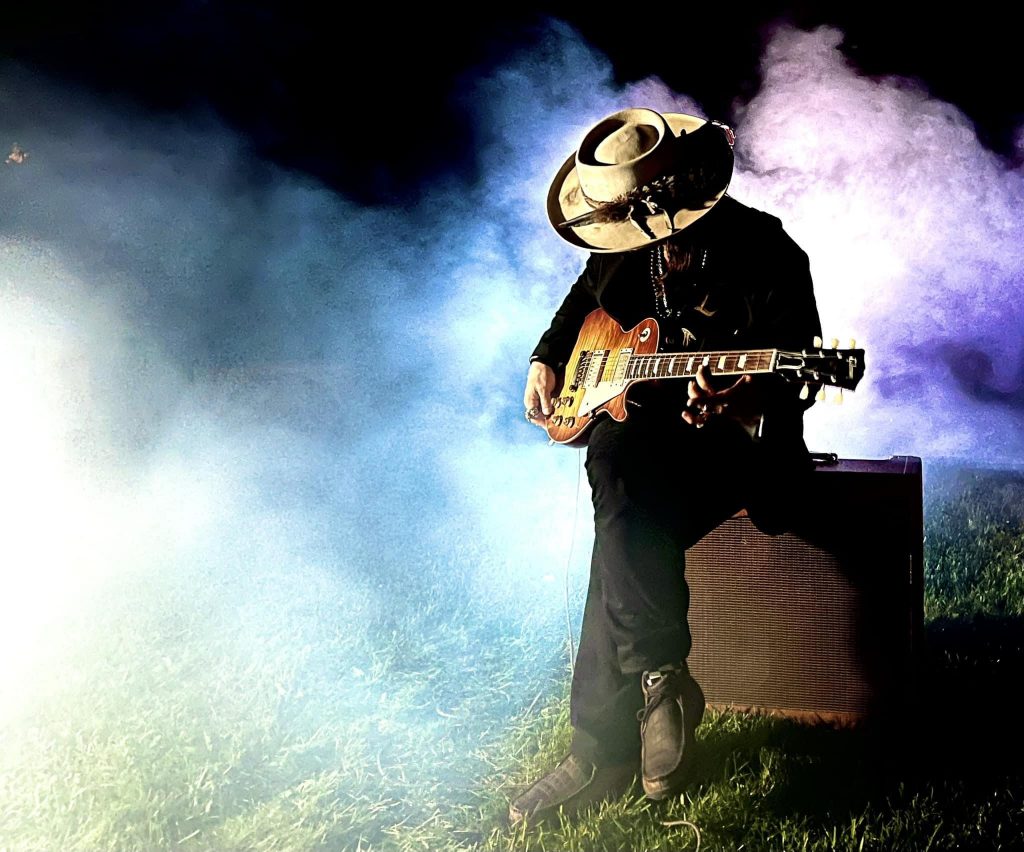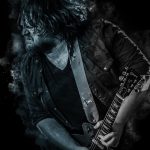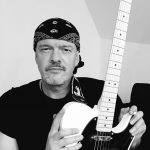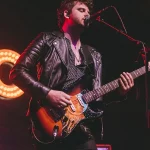A doyen of the modern blues community, we were thrilled to get to speak to Lance Lopez about his first new album in five years, “Trouble is Good.” Looking back, in 2001, Lance won the Blues Band Of The Year award presented by DallasMusic.com. He was also awarded a citation of appreciation from Venlo, the Netherlands, in 2001 during his European tour for 1st Things First. Lance Lopez has been playing to enthusiastic audiences around the region, opening shows for legends like B.B. King; and in Europe, opening for Jeff Beck and Steve Vai, among others.
For anyone who has been with this magazine since we set out about 18 months ago, we are huge BB King fans! We are unapologetic BB King fans, and we are still so thrilled to have a couple of features done with his daughter Shirley, who talked the blues with us when we first set out. We began by asking Lance Lopez about his memories of the great BB as he toured with him as an opener back in the day.
Lance- This is a great place to start, with the King of the Blues! BB King, of the three kings drawn from my guitar influences, along with Albert King and Freddie King. BB was the only one in my lifetime that I was able to see live and know. I had tickets to see Albert King, but he sadly passed away before I could see him. I was introduced to BB King by my father, actually in the late 80s during the whole time of shredding, but I always played in a much more bluesy style, which had everything to do with my father starting me out in rock n roll, Little Richard, Bo Diddley, and so on. So I was playing with kids in the neighbourhood when everyone was into Van Halen and the shredding era, and the kids would tell me I played too bluesy and it wasn’t cool. When I told my father that I was being told I played too bluesy, he put on a BB King album, and it was just as important as discovering Jimi Hendrix for me as that was the sound I was searching for. We moved to Dallas a year later, and I was with my mom in Texas when I saw this giant picture of BB King in the newspaper. I asked my mother if she would take me to BB King, and she agreed. So the first concert I saw with BB (at the Benson and Hedges Blues Festival in 1990) set me on a course to play the blues, and if we fast forward around two years later, I was playing with BB King. My father had known BB King from the 1970s,when he had done some personal security for him, so they knew each other (note, Lance’s father had also served in Germany with the US army in the late 1950’s alongside Elvis, whom he knew). He was the most welcoming, nurturing, inspiring, and influential person. He really wanted to know about me and how I was doing. Every time I met BB, whether I was working with him or not, he would check on me and make sure I had a plate of food backstage or whatever. The influence is insurmountable, and what he did for the electric guitar for modern generations is incredible. As lead guitar players, we wouldn’t have very much without BB King. His importance of knowing the legacy of the blues and the place of the younger artists—that is what I took away from my talks with BB King and how he spoke to me. He said it was up to us to keep the blues moving forward, which is why I have taken on the responsibility of passing on the information and teaching.

In the early eighties, the time of shredding came and shook up the rock guitar world for a while. We see Lance Lopez as more of a slide guitar player. However, during that eighties period, we remember Kiss, for example, deliberately looking for shredding style guitarists and getting Mark St. John in for “Animalize.” Even Vinnie Vincent, when the make-up came off, was into that fast playing sound that went against the more bluesy style of Ace Frehley, who had more connection to that older Delta sound (we did a piece here in the magazine on Lead Belly last year, and he was hugely influential on grunge bands like Nirvana)
Lance- Going back to Kiss. Kiss was the first rock concert I ever went to! I saw them on the tour when the make-up came off (the “Lick It Up” tour with Vinnie Vincent), and I was a small boy, and I cried! I didn’t believe that I was watching Kiss. The whole section had to calm me down. I was so pissed off. Where’s Ace Frehley? When I discovered the blues in June 1990, when I saw BB King and Stevie Ray Vaughan play together, the very next day I had my mother take me to the local shopping mall and record store, and I immediately got the recordings. I wanted to start at the beginning and work my way through. There was a girl I knew who had a copy of “Wheels of Fire,” (Cream, 1968), and I remember hanging out with her and seeing that cover. I didn’t want to talk to anyone else for the rest of the day. Who cared what the others were doing, I wanted to hear that album, and I flipped the album over and was reading that Robert Johnson wrote “Crossroads,” and I would talk to other musicians, and the album had Ginger Baker and Eric Clapton, and the whole thing was amazing, and then Cream was my band from then on. So I knew enough through being introduced to Robert Johnson via Cream, and thanks to Eric Clapton for that. Then I was able to discover, as a 12 year old boy, that I should go out and find Robert Johnson and then go from there, then move onto Lead Belly, Blind Willie Johnson, Muddy Waters, and so forth. I learned from all that. It was strange how bands like Nirvana and Pearl Jam in the grunge era looked at Delta Blues, as I was already into it. But I was there in the music of the 20’s when the other kids found grunge, I also listened to Chicago blues as well as the artists that came from the UK who retranslated the blues for us. Zeppelin, Stones, Cream, and so on.
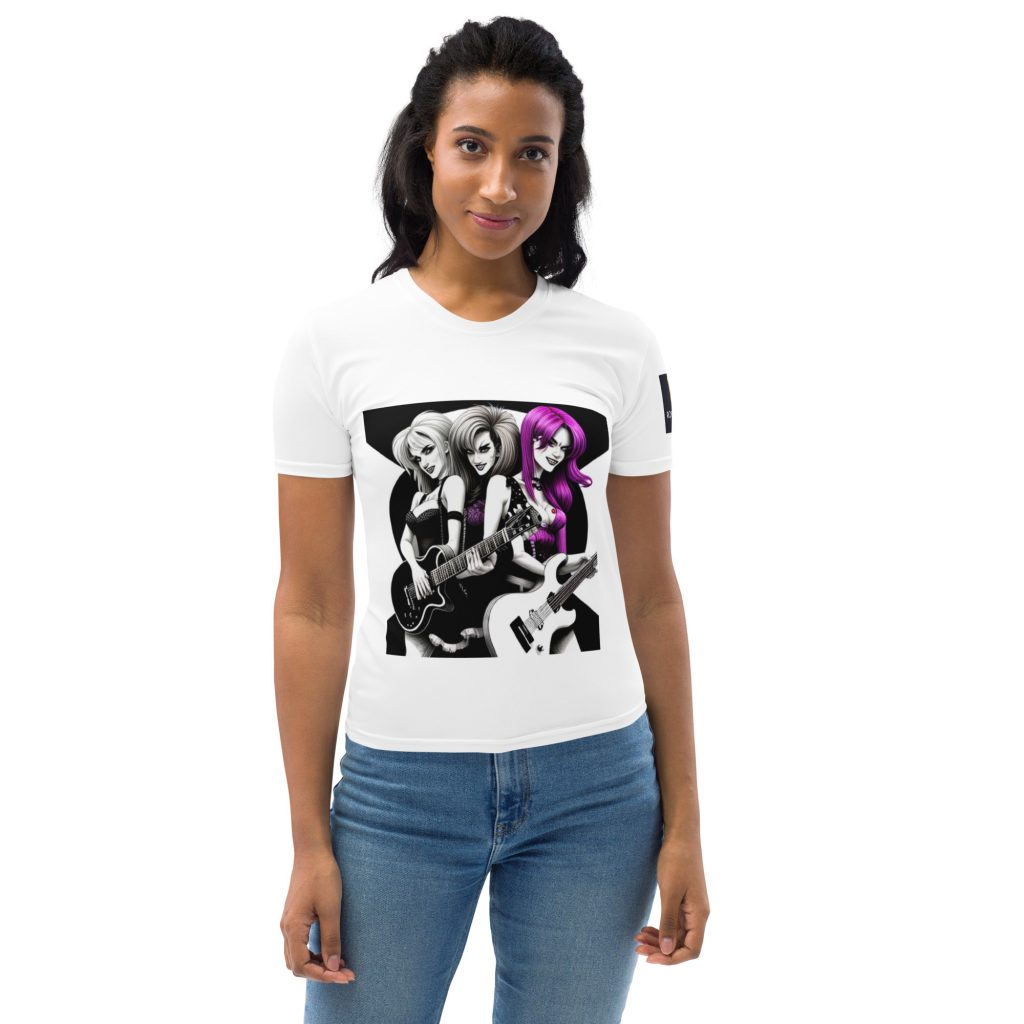
https://rockthejointmagazine.com/merchandise/
That’s interesting, because George Harrison once commented that if there had been no Lead Belly, there would be no Beatles, and Lemmy always said that Motorhead were essentially a blues band. He always laid the blues foundation for Motorhead.
Lance- He was a true bluesman. I had the pleasure of knowing Lemmy. Lemmy and I hung out at the Rainbow Bar and Grill in Hollywood quite a bit (the bar was a regular hangout for not only Lemmy but the likes of Ringo Starr, Keith Moon, and Johnny Cash). I used to stand at the bar while he was over there playing video games, and we would be drinking, and I would be talking a lot! He would be quiet, smoke, and play the video machine. I would be talking away, and he would rarely respond. Then we were doing a warm up show on the West Coast on the tour, and the manager of the Rainbow offered us the chance to do a warm up show at the Rainbow, and I was happy to do it. So we started the tour on the West Coast and were doing the show upstairs at the Rainbow. I had a drummer with me who was in a band called Powerman 5000, they are still around, and they are kind of sci-fi metal. So Al Pahanish was the original drummer of Powerman 5000, and he was playing drums with me. He was a very educated drummer and had played with me at the Rainbow to a packed crowd, and we were taking down the gear when Al grabbed me to say that Lemmy was here and wanted to talk with me. So my shirt is pulled, and Lemmy is there with Duff McKagan (bass player with Guns and Roses), and Duff tells me that Lemmy has told him that there was this kid from Texas that he needed to see play guitar! I laughed, as I had been talking to Lemmy for ages and he had barely said one word, and now this! But Lemmy was the best, and I miss him so much. I got to hang out with some iconic bluesmen, and Lemmy was a true bluesman.
Moving on to guitar solos, we talked next about the Frank Zappa side of guitar playing, where he went for total spontaneity and never knew from night to night how his solos would form. So how did Lance approach the solo?
Lance- I do both the spontaneous solo and the choreographed solo the audience expects, probably more so when playing in the studio. There are certain songs that, musically, I feel the need to write a guitar solo for, for instance, the song “Uncivil War” on the new record. I wrote a guitar solo and kept it very thematic and musical, almost to the point where our producer, Joey Sykes, was saying, That’s another guitar part,’ and was saying it was a guitar solo. Joey wanted me to shred more, and I wanted to be musical and thematic, where you could hum the guitar solo. You know the moment when the guitar solo comes, and you can sing along to the guitar solo like you can sing along to the rest of the lyrics. Live, I draw energy from the crowd and give that back to the audience, that is the cycle of energy where I get energy from the crowd and give that back in my guitar playing. That is a huge factor in the improvisational level of the guitar work. Therefore, it is a little of both, and occasionally I will lose control.
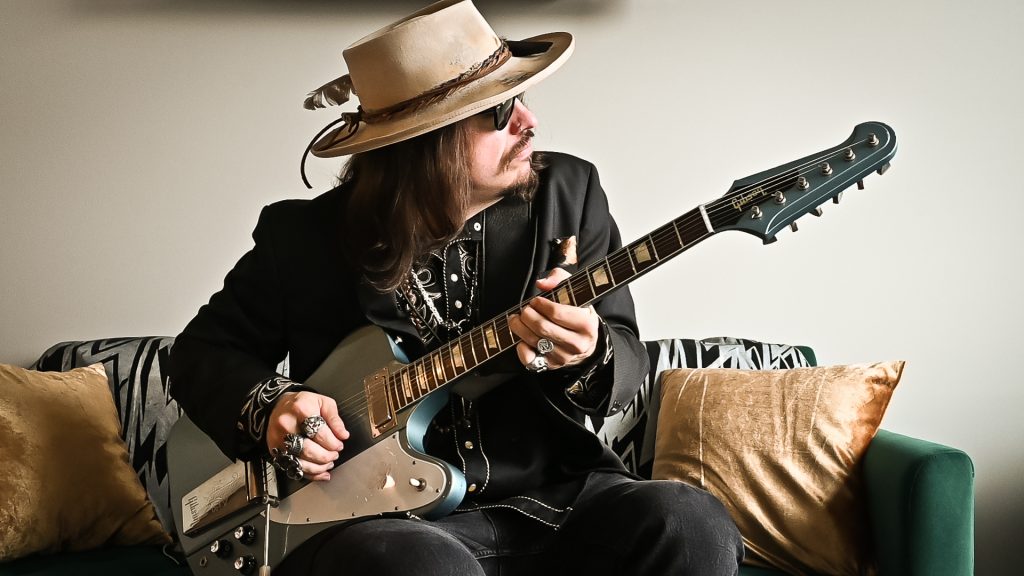
We see Lance as more of a melodic guitar player, and we must say here at the magazine, we like melody in all aspects of the music we cover, it is a common theme in the acts we support.
Lance- Melody is so important. Me and one of the great guitarists here in Nashville, Tom Bukovak, were at a jazz club last year, and we saw a guitar player doing some avant-garde guitar playing, and that was something he reached over to me to say that he was waiting for a melody. It was avant-garde noises and sounds, and we were trying to be open-minded, but we were searching for melody. The melody is also part of the story of the music. I grew up listening to melodic guitar players and melodic music.
As Shirley King told us, at the heart of every good song is the blues. But you have to have lived to sing the blues. With his material, Lance touches emotion. We love an earlier song here called “Blue Moon Rising.” As a writer, does Lance feel we have to have lived to sing the blues? As he gets older, is Lance tapping more into his past?
Lance- Absolutely, without a doubt. I also remember BB saying, You don’t have to live the blues to play the blues, but it helps! When I instruct kids on how to play the blues, I can technically teach you how to play it, but when I hear the kids bending certain notes, there is that extra thing you put behind it – and that is the blues. Sometimes the kids can achieve without life experience! But sometimes pain and life experience are what is required. For instance, I had a young lady I worked with for many years who is now very successful called Ally Venable (ETX Music Awards 2015, 2016 blues band of the year). She was a young guitar player, and I worked with her. She began to get some attention in her hometown, as her name was rising. She was going to High school, and she was getting really good gigs, getting in the papers, and so on, and in school there was this group of girls who set about bullying her, they treated her really mean, it was a bunch of cheerleaders who bullied her as she was popular. I went to her house to give her a guitar lesson at that time, but she was upset and did not come out of her room. But I went up to her and told her these emotions were exactly what she needed to channel into her guitar right now. She put her emotion into the guitar, and that was a key moment when the blues made sense to her. So the blues is taking those life experiences and incorporating them into your music. Then again, in COVID, we all had the blues. If you didn’t have the blues before 2020, you certainly got them then.
The last album, “Tell the Truth,” was released in March 2018, so much has gone on since then. So does Lance feel the new album remains a close relative of “Tell the Truth” or has so much happened since that it has seen a new direction musically.
Lance- I moved to Nashville and took a bit of a break to focus on wellness and health; I had been on the road for some time and had a marriage that was ending, things were tumultuous. So I needed a break. When we began again after that break and began to focus on getting back out, we had offers from Scandinavia and so forth, and were thinking about going in and doing a record, but then COVID hit. So we were preparing, and then Bang! A lot of people say we missed two years of life due to COVID, we were all imprisoned, so maybe it’s been three years between albums, really! “Trouble is Good” helped me through those times. We took about 16 months off, but we recorded through COVID, and the break really did help; it was a longer break than I wished to take. Usually I take about 3 years between records, but I handcrafted the songs and sound, picked the right musicians, and concentrated on the ten songs to get them right.
Lastly, what’s happening in the world of Lance Lopez now, in 2023? The first single “Jam With Me” has been put out with a promotional video, and the new album came out on July 14th, so these are exciting times again!
Lance- We have another single coming, “Uncivil War,” and the official album release party is coming up here in Nashville in August. There is also a tour starting in Florida in September, all in the south, covering Louisiana and Texas. And next year, we hope to head towards you guys in the UK.
Thanks for this, Lance, To quote BB King, “People all over the World have problems. As long as people have problems, the blues can never die.”
A listen to “Trouble is Good” quickly blasts away life’s blues; if you have the blues when you put the record on, they will have flown away by the end. Standout tracks are “Jam With Me,” “Uncivil War, and “Take a Swing.” It has a heavy sound, slick guitar work, and creativity oozing through it. If you don’t know Lance and his work, then grab this one for lovers of the blues, ZZ Top and classic rock sounds everywhere.
As a last point, we work hard here to bring you great features and reviews. We always do, however, appreciate it when people buy us a coffee by clicking on the “support us” button below. Thanks.
You can download it here.
A link to Lance Lopez Facebook page
By Mark C Chambers
and
Lorraine Foley

